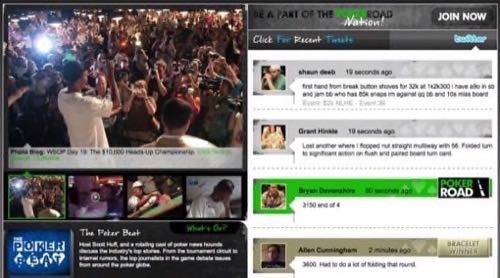Doyle Brunson is seventy six years old and he says he was up late last night in Vegas. He’s in a $10k game on the 24th day of the World Series of Poker and he just sent out a Tweet. “Still in 10k split,” he said. “Didn’t sleep much but feel OK….” Is that an intimate look inside the minute by minute, high-stakes life of a poker veteran – or is that a head-trip of a bluff intended to make his opponents think he could be slow on his game today?

The World Series of Poker is a 39 year old annual event where thousands of professional and amateur poker players fight through 40 tournaments for tens of millions of dollars in prize money. The event is different this year, because Twitter has come to the world of poker and it’s changing the way the whole industry relates to the game.
Poker is a giant industry. Online gaming is subject to all kinds of legal regulations, vagaries and pitfalls but real world competitions like the World Series of Poker have their own media covering play by play, hand by hand and tournament by tournament. Much of that media coverage now goes on online. As a growing number of poker players are beginning to send out short messages to the world via Twitter, existing poker media is being disrupted and the news sites are scrambling to out-compete with each other in responding to the players’ direct and immediate communication with their fans. Players are reading each others’ Tweets, too, and that has consequences.
We talked about all this disruption with Joe Sebok, a poker player, the CEO of the Poker Road news site and a man with almost 330,000 people following him on Twitter. (He met with Twitter’s business development department and while they wouldn’t cut an official deal with him – they did put him on Twitter’s high profile Suggested Users List.) All the major poker news sites are racing to integrate Twitter and Sebok says his site isn’t one of the biggest – but as far as we can tell, Poker Road’s use of Twitter during the World Series of Poker may be defining the state of the art better than anyone else in the industry.

“It’s completely changing poker for the audience,” Sebok says of Twitter. “Traditional poker media coverage is a lot of hand histories online. It’s bland and basic. Now you get to hear players exclaim and interact – ‘oh I feel so sick’ or ‘oh that player is a knucklehead.’ They upload pictures and they reply to each other. It gives you a sense of the pressure these guys are under and what it’s like to be here.”
Poker is a psychological game – and you can imagine how the pros are strategizing about their use of this new method of communication.

“People are calling it Tweet bluffing,” Sebok says. “It’s a game within a game situation and it’s effected the way the games go. It’s enabling the fans at home to climb into the minds of the players but if they are smart they know they can climb into each others’ minds too: to see who tilts, who rolls with the bad situations and who flies off the handle. Players spread misinformation like ‘I’m going to play tight’ when they are really going to play loose. We do that verbally but since Twitter is written, it seems more believable. But it’s just the beginning of all this, it’s blown up in last 2 or 3 months.”
As if cautious that his enthusiasm could rock a boat that’s fun to ride, Sebok also tempers his assessment of the new medium’s impact, saying that “it’s mostly a way to communicate with the larger community, but it’s raised some questions about changing the game. Ultimately, I think if it’s a tweet or a conversation out loud it’s the same. As long as it’s not within a hand the players can use their phones and the World Series has been pretty receptive. They haven’t made any rules saying you need to get up or leave the room.”
Big name players are Tweeting but small timers at the big show are too. Traditional poker reporting didn’t shed much light on the experiences of amateurs, but Sebok says those players on the margins can now tell their families and friends to check Twitter for hand by hand accounts of their experiences in Vegas.
Sebok’s company doesn’t just point its audience at players’ Tweets, though. Simple aggregators of messages from players are available elsewhere. His Poker Road Nation site adds several layers of value on top of the flow of messages. It marks up through hashtags and manual categorization each tournament and game for sorting. It shows threaded conversations. It lets site visitors login to Twitter and post live replies to the players right on the Poker Road Nation site. “Inline replies is the most exciting part to me.” Sebok says. Soon, the site will add inline photo display and an in-house video hosting and embedding feature. It’s an operation so full-featured that anyone interested in Twitter aggregation can appreciate it, whether you’re a poker fan or not.
Sebok is a Berkley grad who crashed and burned through the dotcom era but aims to bring the best parts of a dotcom mentality to the world of poker media. Poker reporter Jeff Holsey approached him early this year with a proposed design for a Twitter section of the Poker Road site. The company already had a popular podcast and Sebok was very interested in trying to do Twitter integration well.
“Jeff said poker coverage could be done more effectively if it came from the players themselves,” Sebok remembers. “He is always pushing the envelope. Even though reporting on poker is his job, he’s always looking for the next thing.”
Should journalists in this field not worry that direct public communication from the players, the sources, could threaten their professional reporting jobs? “They should look at how this will supplement their jobs,” Sebok says. “Their jobs will change but not disappear. We can look at interviews to support those tweets we see, for example. It falls on us to figure out how this won’t kill us, but it’s going to change everything.”










